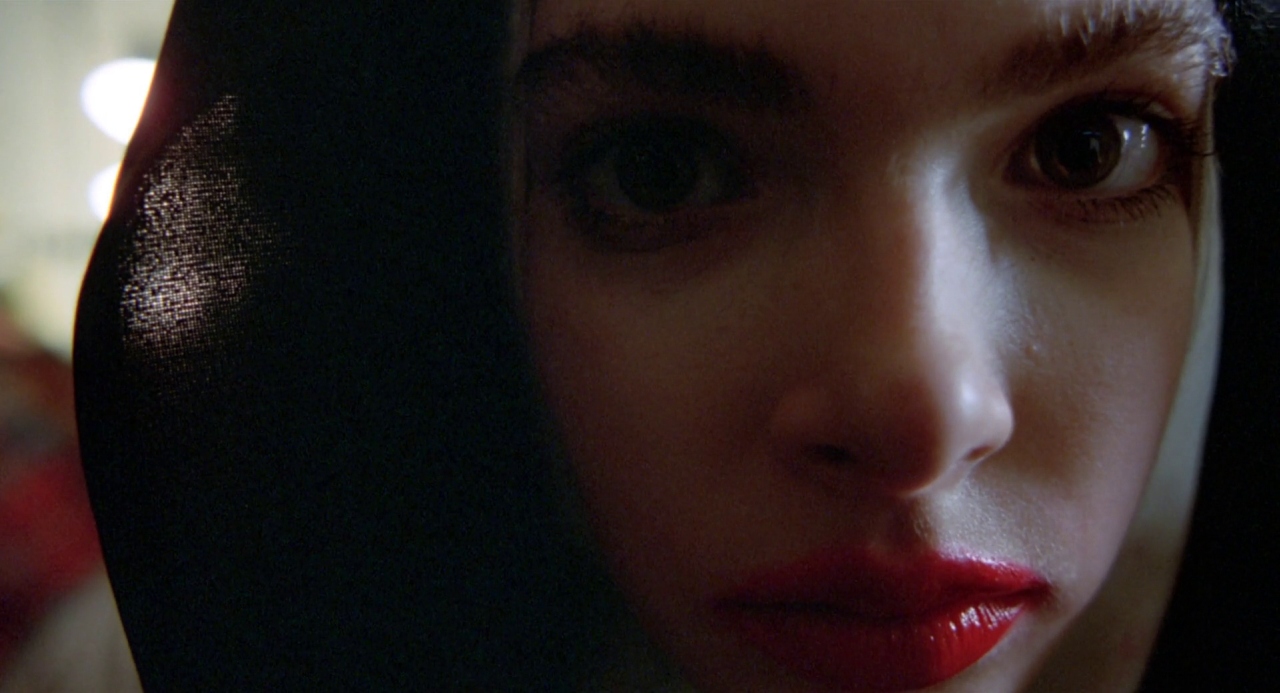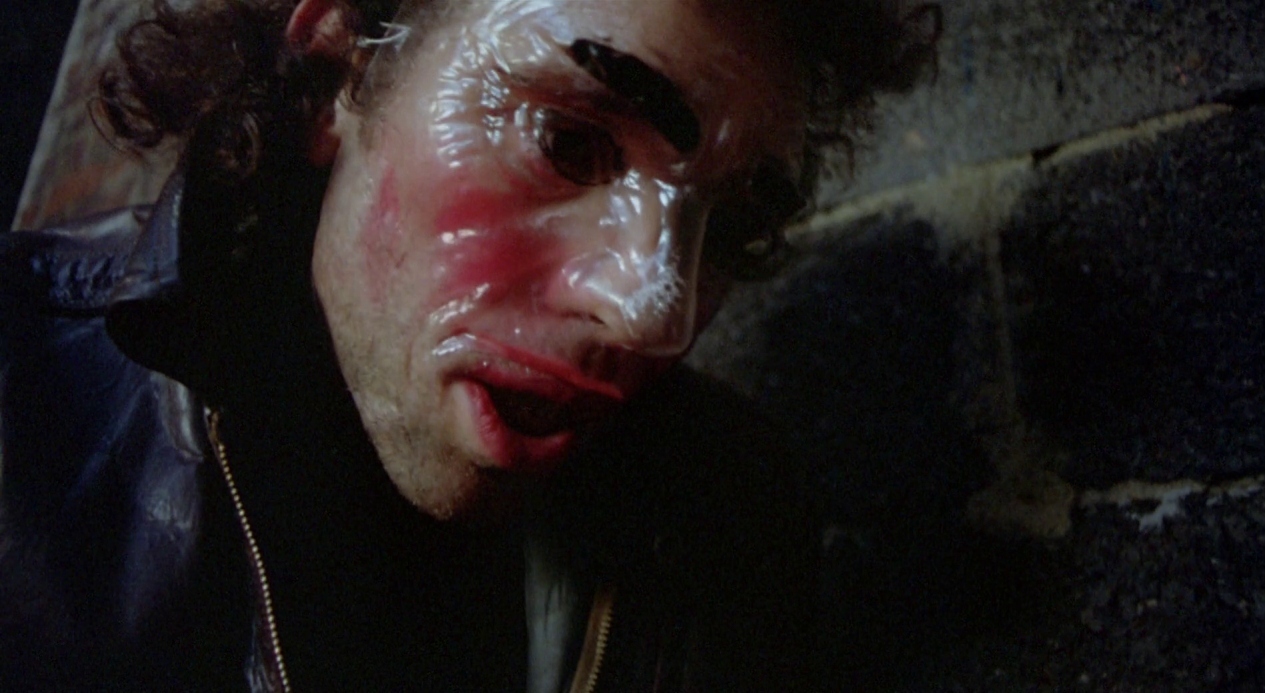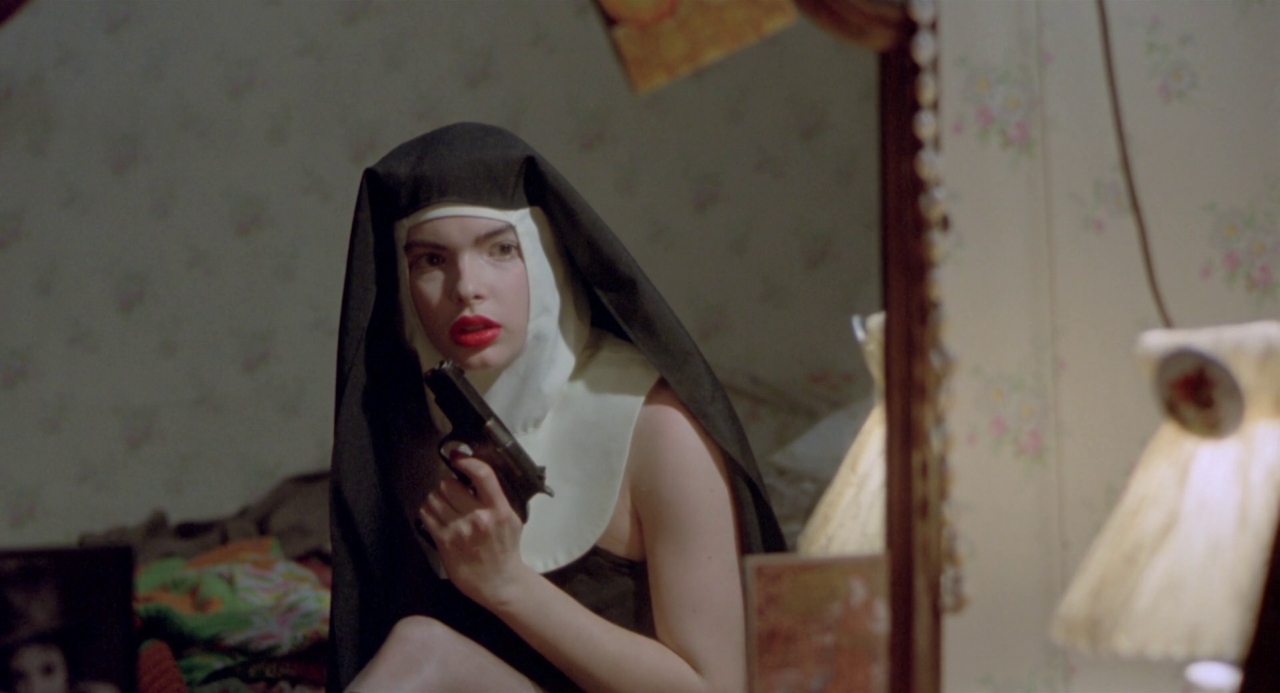MS .45 (1981)
After being attacked and raped twice in one day, a timid, mute seamstress takes to the streets after dark and randomly shoots men with a .45 caliber pistol.

After being attacked and raped twice in one day, a timid, mute seamstress takes to the streets after dark and randomly shoots men with a .45 caliber pistol.

For almost five decades, Abel Ferrara’s been one of America’s most polarising and provocative filmmakers. Emerging from the primordial ooze of New York City’s gritty independent scene, his first credit for the pornography 9 Lives of a Wet Pussy (1979) offered little hint of his artistry. However, he gradually developed a distinct cinematic voice that combined the moral desolation of urban America with existential inquiry. Ferrara made his mark with The Driller Killer (1979), a confrontational blend of punk nihilism and graphic violence that helped define the controversial “video nasty” era. It also announced a director unafraid to confront the depravity of modern life, laying the groundwork for a career defined by extremes. King of New York (1990), Bad Lieutenant (1992), and Body Snatchers (1993). However, it was his second feature that solidified his reputation as a provocateur with genuine artistic and thematic ambition. A cornerstone of the rape-revenge genre and a seminal entry in feminist exploitation cinema.
Timid Thana (Zoë Lund) is a young mute seamstress working in a small fashion house in New York City’s garment district. When she’s not avoiding unsolicited advances from her unctuous boss (Albert Sinkys), she moves through the city’s streets under a constant barrage of predatory stares and sexual taunts. While walking home from work one evening, she’s violently assaulted by a masked stranger in an alleyway. Shaken and traumatised, she returns to her small apartment without reporting the incident. Upon arriving home, Thana’s once again confronted by a second assailant who holds her at gunpoint and assaults her again. In the struggle that ensues, she murders the burglar with a heavy paperweight. Overcome by fear and confusion, she methodically dismembers the corpse in her bathtub and disposes of the remains across Manhattan. What begins as an act of survival gradually transforms into something darker. Disillusioned by the pervasive misogyny surrounding her, Thana channels her rage into a relentless crusade against men she perceives as predators. However, as her campaign of retribution intensifies, the boundaries between justice and obsession begin to dissolve. Beneath the surface of her newfound autonomy lies a woman consumed by the violence that once destroyed her.
After emerging as a counter-culture icon with striking intellect and musical talent, Zoë Lund’s almost sculptural features serve Ferrara’s vision perfectly. At only seventeen, the former model delivers a performance of astonishing maturity and complexity as Thana. Oscillating between raw vulnerability and ferocious tenacity, the actress embodies the mute seamstress whose descent into vigilantism becomes both harrowing and hypnotic. Deprived of any spoken dialogue throughout the 90 minute runtime, Lund communicates with devastating eloquence through the subtlest expressions and movements. Whether it’s the tightening of her jaw as she endures sexual taunts from men or the hollow gaze of her eyes during the aftermath of assault, her face becomes a landscape of unspoken trauma. Initially, she appears like a spectral figure, an innocent drifting through the moral decay of Manhattan’s streets. However, as the narrative progresses, her beautiful porcelain face hardens into a chilling mask of retribution.

As Thana metamorphoses into an architect of vengeance, Lund exudes the fatalistic glamour and the alluring cool of a femme fatale with an inhabited recklessness underlined by crimson red lipstick. Without ever succumbing to theatrical excess, the actress radiates a detached calm that renders her acts of retribution all the more unsettling. The character demands conflicting layers of submission and domination to be brought to the surface, and the results could have veered into caricature in the hands of a less capable performer. However, she transitions between victimhood and predation with an unsettling grace. Whether cloaked in an eroticised nun’s outfit brandishing a pistol or the banal domesticity of overalls and an ironing board, she maintains an uncanny coherence of character. It’s a delicate balancing act between fragility and ruthlessness, but she compartmentalises the opposing sides of her character’s personality wonderfully.
Ms .45 (known internationally as Angel of Vengeance) represents a notable artistic leap forward for director Abel Ferrara, signalling a deliberate and confident step beyond the anarchic excesses of The Driller Killer. While his directorial debut was undeniably visceral and visually arresting, it remained mired in its own punk sensibilities and plagued with an unhinged energy. However, Ferraratempers that chaos into something chillingly precise with his sophomore effort. It reveals a filmmaker beginning to command tone and psychological nuance, while distilling the same preoccupations into something far more disciplined and coherent. The decision to centre the narrative on a mute protagonist forces the director into a different mode of visual storytelling. He must communicate Thana’s interiority through image, gesture, and rhythm, demonstrating a pronounced understanding of cinematic language.
Nowhere is this precision more evident than in the handling of the two sexual assault sequences. Rather than indulging in exploitative voyeurism, Ferrara admirably refuses to objectify Thana or aestheticise her suffering. Hames Lemmo’s (Madman) expressive cinematography fixates on her silent screams and harrowing fear with excruciating detail, conveying a suffering so internalised it almost becomes abstract. Admittedly, Ms .45 may appear somewhat unpolished considering its $62,000 budget, but Ferrara’s ability to transform those limitations into advantages has always been deeply admirable. In reimagining the conventions of exploitation cinema through a lens of existential despair, he reveals himself as a punk provocateur refining his chaos into cinematic purpose.

Where Ms .45 distinguishes itself from contemporaneous exploitation cinema such as Wes Craven’s The Last House on the Left (1972) and Meir Zarchi’s I Spit on Your Grave (1978) is in its refusal to simplify predation into a convenient moral dichotomy. Ferrara refuses the notion that sexual violence is exclusively ingrained in degenerate criminals or backwoods psychopaths haunting the fringes of society. Instead, he suggests it’s an omnipresent sickness that transcends social class and occupation. It’s ingrained pathologically into the very structure of urban life and perpetuated by men across the social spectrum. The varying degrees of men abusing their power come to fruition during the climactic Halloween party Thana attends with her boss. The audience overhears several conversations that expose the normalised cruelty underpinning male privilege. Two businessmen discuss the transactional process of purchasing virgins abroad, reducing exploitation to pleasure. Whereas another conversation involves a woman confronting her husband for backing out of a vasectomy he had promised, underscoring a subtler form of control. These short moments of dialogue coalesce into a damning portrait of the various ways misogyny is present in our lives.
Some detractors may question the legitimacy of Ms .45 as a feminist text, considering it was written by Nicholas St. John (The Addiction) and directed by Ferrara. However, despite being helmed by two male figures, it’s undoubtedly a potent feminist work. Thana’s actions are merely a perpetuation of the patriarchal violence she’s experienced, an echo of the aggression that has defined her existence. Ferrara constructs his central philosophy around his protagonist’s mutism,using it to expose a world that denies women their voice and relegates them to objects of spectacle. The decaying urban backdrop of 1980s New York City practically serves as the character itself. It was a city defined by economic decline, rampant crime, and constant threat of sexual violence, where toxic masculinity permeated both public and private sectors, shaping environments that normalised women’s vulnerability.
Within this landscape, Thana emerges as a symbol of the silences and brutalised feminine experience. She’s unable to scream during her assaults, she cannot articulate her trauma to her work colleagues, nor can she demand justice in a society deaf to women’s pain. Her voicelessness represents the systematic indifference that surrounds her and is an indictment of a culture that refuses to hear female anguish. When Thana takes up the .45-calibre pistol and begins her violent metamorphosis, she’s speaking through action. The weapon becomes her voice, and each shot fired functions as a syllable of a language forged from rage. The violence she imposes is a reflection of the brutality she has endured in a world that communicates with her through domination and cruelty. Therein lies the brilliance of Ms .45; it transcends the garish confines of exploitation cinema, emerging as a bleak moral enquiry into the enforced silence of sexual assault survivors, and by extension, women in general.

What could have been a straightforward tale of feminist emancipation becomes something much more interesting as Ferrara focuses on the psychology of vengeance instead of its sensational trappings. Much like Michael Winner’s Death Wish (1974) and Martin Scorsese’s Taxi Driver (1976), Ms .45 dissects the festering psyche of those shattered by trauma whose thirst for justice transforms into self-destruction. As Thana begins targeting men who embody various chauvinistic archetypes, such as the abusive pimp hassling his sex workers or the gang of potential rapists, her actions are a desperate attempt to reclaim control. Yet each act of vigilantism she commits only deepens her isolation, simultaneously consuming her instead of liberating her. Thana’s less righteous attacks, like that of a leering photographer or an inappropriate salesman, begin corroding her humanity further, turning agency into a ritualised form of self-destruction. Her descent eventually culminates with devastating irony when the vigilante is destroyed by the very thing she hopes to protect. In this final betrayal, Ms .45 leaves its audience contemplating the futility of violent catharsis in the face of psychological ruin.
Initially, Ms .45 was relegated to Grindhouse circuits and arthouse cinemas during its theatrical release. It suffered from limited distribution and was subject to alterations for censorship reasons. Despite these constraints, it grossed an estimated $2M against its minuscule budget. However, it began its true cultural afterlife on the home entertainment market, where it became a cult sensation among cinephiles and scholars alike. What was once dismissed by critics as sordid exploitation was re-evaluated as a searing meditation on gendered violence and female subjectivity.
Its notoriety would prove inspirational for several contemporary filmmakers fascinated with female vengeance, and its fingerprints can be found in works such as Luc Besson’s Nikita (1990), Quentin Tarantino’s Kill Bill (2003), and Emerald Fennell’s Promising Young Woman (2020). Even more directly, Ms .45 marked a crucial juncture in Ferrara’s artistic evolution, prefiguring his subsequent meditations on moral corruption such as King of New York. It also granted the director the opportunity to co-write Bad Lieutenant with Lund before her life spiralled into addiction and tragically ended prematurely in 1999. What might have remained an obscure entry in the exploitation archives now endures as an unflinching critique of patriarchal violence and a vital text in feminist revisionism.
USA | 1981 | 80 MINUTES | 1:85:1 | COLOUR | ENGLISH

For the first time in the UK, Ms .45 has received a wonderful 4K restoration courtesy of Arrow Video. Sourced from the original 35mm camera negative, the 2160p Ultra HD transfer is presented in its original aspect ratio of 1:85:1 and was supervised by director Abel Ferrara.
After being relegated to a DVD-only release, the quality of this transfer is a remarkable upgrade. The addition of Dolby Vision adds a pleasing visual element to the presentation and renders the colour palette beautifully. Primaries are accurately reproduced and maintain vitality without sacrificing the nicotine-stained interiors and filthy streets of 1980s New York City. The image is deceptively sharp, containing an excellent amount of clarity and drawing out plenty of delineation. Daylight excursions through Manhattan reveal the city’s decrepit architecture that was once lost in previous releases. Tight compositions offer a perceptible level of detail, revealing individual clothing textures and facial blemishes.
There are no significant stability issues to report, but a healthy amount of grain is observable. This is especially noticeable during scenes inside Thana’s claustrophobic bathroom and a particular hallucination sequence. However, these blemishes are true to the original release and remain faithful to its low-budget aesthetic. Overall, the presentation boasts a substantial improvement, and fans of Ms .45 will find Arrow Video’s release a resounding upgrade over any previous release they have encountered.
Unfortunately, Arrow Video presents this 4K Ultra HD transfer with a single LPCM Mono audio track, accompanied by optional English subtitles. The mix is not a showcase of aural fireworks but maintains a pleasing level of fidelity. Joe Delia’s (Dangerous Game) evocative score is rounded nicely during key moments and offers a pleasing level of sonic clarity. The soundstage creates an immersive atmosphere and becomes particularly engaging during outdoor sequences in the bustling streets of New York City. Dialogue is discernible and remains anchored primarily at the front, but is somewhat limited by the original mono source. The audio becomes occasionally distorted during certain sequences. However, it honours its exploitation roots, remaining generally nicely balanced. Overall, this is a solid transfer and perhaps the best Ms .45 has ever sounded.

director: Abel Ferrara.
writer: Nicholas St. John.
starring: Zoë Lund, Albert Sinkys, Darlene Stuto, Helen McGara & Nike Zachmanoglou.
